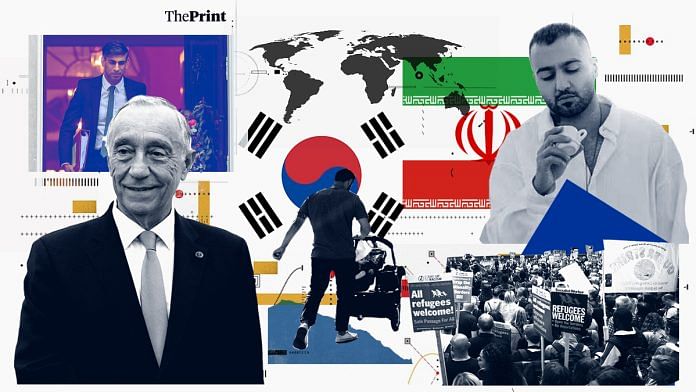New Delhi: The UK Parliament Tuesday passed the contentious Safety of Rwanda Bill that will allow the country to deport asylum seekers to Rwanda, which will take up their asylum claims.
Prime Minister Rishi Sunak in a post on X said: “No ifs, no buts. These flights are going to Rwanda”.
The bill aims to stop “illegal” migration, especially by those who cross the English Channel by boat, and also to safeguard asylum seekers from any dangers from ‘sophisticated gangs’. According to Sunak, it was to “deter vulnerable migrants from making perilous crossings and break the business model of the criminal gangs who exploit them”, Sunak said.
The Safety of Rwanda Bill was tabled alongside the UK-Rwandan Asylum Partnership Treaty. According to the Home Department’s submission to the UK Parliament, the treaty ensures the safety of those relocated, five-year support, fair processing of asylum claims, and humanitarian protection. In the video, Sunak also thanked the government of Rwanda for strengthening its asylum system.
The Rwanda asylum policy, first conceived two years ago, was deemed unconstitutional by the UK’s Supreme Court on the ground that it violated both domestic and international law. The court also took cognizance of the state of human rights in the African nation and said that there were “substantial grounds to believe” that ill-treatment and further deportation could occur.
Tuesday’s bill is a new version of the same piece of legislation.
Meanwhile, Opposition leaders and human rights activists have raised concerns over the law. While the Human Rights Watch called it a “dark day in the United Kingdom”, Filippo Grandi, the UN high commissioner for refugees, said it was part of the UK’s “efforts to shift its responsibility for refugee protection, undermining international cooperation”.
Also Read: Singapore’s next PM, South America’s drought crisis & other global news you may have missed
Iranian rapper gets death penalty for anti-establishment songs
Iranian rapper Toomaj Salehi has been sentenced to death for participating in the 2022 protests sparked by the custodial death of 22-year-old Mahsa Amini after she was detained for not wearing the hijab properly.
Toomaj Salehi, 33, was first arrested in 2021 for his anti-government and anti-establishment songs. Although he was released shortly after, he continued to post music that expressed his opposition to the regime and has faced numerous arrests. “He had also written songs about the protests,” DW reported.
Mahsa Amini’s death had led to large-scale protests, with people burning hijabs. The Iranian conservative government cracked down on these demonstrations, arresting and even executing them. The death penalty rose by 43 percent in the country and executions reached an eight-year high after these protests.
The Islamic Republic Revolution Court of Isfahan gave Salehi the harshest punishment — for “corruption on Earth”. According to Salehi’s lawyer Amir Raesian, this court order contradicted an Iranian Supreme Court ruling qualifying Salehi’s case for amnesty. Salehi has 20 days to appeal the order.
Portugal wants to pay for its colonial past
Portuguese President Rebelo de Sousa Tuesday made a significant statement on the country’s imperial past. Speaking to reporters, he said the country needed to take responsibility for its actions as a coloniser, hinting at reparations.
“It’s not just saying sorry, which is undoubtedly due, for what we did because saying sorry is sometimes the easiest thing to do. You say sorry, turn your back, and the job is done. No, it is the assumption of responsibility for the future of the good and bad things we did in the past,” he said during a commemorative session of the 49th anniversary of the 25 April Revolution — an event that initiated the decolonisation of Portuguese colonies.
Brazil, a former colony of Portugal, has offered help in developing reparation actions.
The question of reparations has been looming over Europe for a while now. In 2021, Germany apologised to Namibia and offered to fund reconstruction projects in the African country, hoping for reconciliation. Even the UK agreed to pay reparations to the victims of its crackdown on the Mau Mau rebellion in Kenya, and France committed to returning stolen artifacts. However, so far, these promises have mostly remained on paper, with little concrete action.
Last week, the UN High Commissioner for human rights pressed on the need for reparations and acknowledgment, calling for amends to be made over slavery and colonisation. “On reparations, we must finally enter a new era. Governments must step up to show true leadership with genuine commitments to move swiftly from words to action that will adequately address the wrongs of the past,” he said.
How to get people to have more children? Pay them, says South Korea
Concerned about its declining population and diminishing birth rate, South Korea is considering incentivising childbirth and is conducting a survey to gather feedback.
The East Asian country is considering payment of 100 million won (INR 60 lakhs) to parents for each newborn baby, the Independent reported. The survey intends to understand the acceptability among the public of spending 22 trillion won (over one trillion INR) to address the problem of low births, and if it is a good enough incentive for couples.
The South Korean birth rate reached its lowest in 2023, at 0.72 babies per woman in a lifetime. The low birth rate is being attributed to the high cost of living.
The South Korean government already provides financial assistance for children from their birth until they reach the age of seven.
A construction firm had offered a similar incentive earlier this year to counter the country’s declining birth rate. It was reported in February that Booyoung Group had offered its employees up to $75,000 (Rs 62 lakh) to have children.
(Edited by Uttara Ramaswamy)
Also Read: Crisis in Haiti, Ukraine’s war against Russia in Sudan & other global news you may have missed



